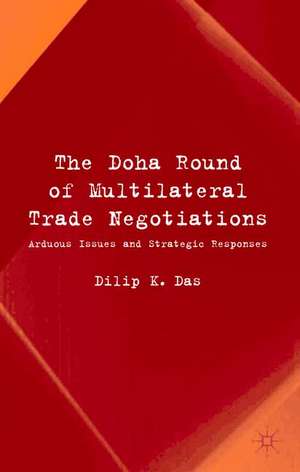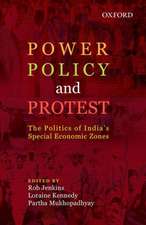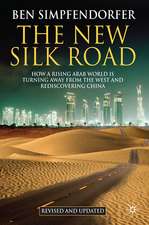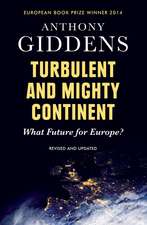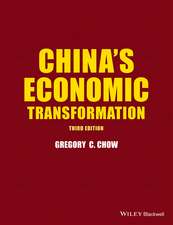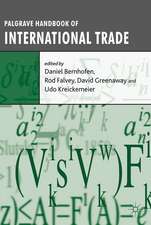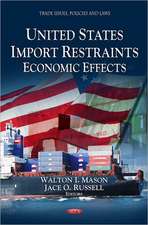The Doha Round of Multilateral Trade Negotiations: Arduous Issues and Strategic Responses
Autor D. Dasen Limba Engleză Hardback – 15 iun 2005
Toate formatele și edițiile
| Toate formatele și edițiile | Preț | Express |
|---|---|---|
| Paperback (1) | 720.75 lei 6-8 săpt. | |
| Palgrave Macmillan UK – 2005 | 720.75 lei 6-8 săpt. | |
| Hardback (1) | 638.57 lei 6-8 săpt. | |
| Palgrave Macmillan UK – 15 iun 2005 | 638.57 lei 6-8 săpt. |
Preț: 638.57 lei
Preț vechi: 751.25 lei
-15% Nou
Puncte Express: 958
Preț estimativ în valută:
122.19€ • 127.57$ • 101.13£
122.19€ • 127.57$ • 101.13£
Carte tipărită la comandă
Livrare economică 04-18 aprilie
Preluare comenzi: 021 569.72.76
Specificații
ISBN-13: 9781403949653
ISBN-10: 1403949654
Pagini: 224
Ilustrații: XVII, 224 p.
Dimensiuni: 127 x 203 x 25 mm
Greutate: 0.37 kg
Ediția:2005
Editura: Palgrave Macmillan UK
Colecția Palgrave Macmillan
Locul publicării:London, United Kingdom
ISBN-10: 1403949654
Pagini: 224
Ilustrații: XVII, 224 p.
Dimensiuni: 127 x 203 x 25 mm
Greutate: 0.37 kg
Ediția:2005
Editura: Palgrave Macmillan UK
Colecția Palgrave Macmillan
Locul publicării:London, United Kingdom
Cuprins
PART 1: THE DOHA ROUND OF MULTILATERAL TRADE NEGOTIATIONS: SETTING AND OVERTURE Multilateral Trade Regime Trade and Growth: The Orthodox View A Global Public Good Perspective Reforming the Global Public Good Provision From the Vantage Point of the Doha Round Debacle at the Third Ministerial Unbalanced Harvest of the Uruguay Round Conclusions and Summary PART 2: EQUILIBRATING THE GLOBAL TRADING SYSTEM AND THE DOHA ROUND Changing Emphases of Successive MTNs Rebalancing the Country Groups Balancing the WTO Architecture Skewing the Benefits of the Doha Round Broad Aspects of Tariff Slashing Modalities Areas of Specific Focus for Redressing the Imbalances Potential for Welfare Gains Conclusions and Summary PART 3: SETBACK IN CANCÚN: SALVAGING THE DOHA ROUND Launching the Fifth Ministerial Conference Mechanics of Failure High Stakes for the Developing Countries Participation of Developing Economies in the Doha Round of MTNs Market Access for Non-agricultural Products Progress since the Launch of the Doha Round of MTNs The Causal Factors behind the Setback in Cancún The Best Thing about Failure Conclusions and Summary PART 4: THE DOHA ROUND AND THE DEVELOPING ECONOMIES Multilateral Trade Regime and the Developing Economies A Developmental Round: Abiding by the Basic Principles Special and Differential Treatment Hierarchies of Beneficiaries and Preferential Market Access Small Developing Countries in the Doha Round MFN-Based Liberalization; A Possible Doha Round Innovation Intra-developing Country Trade and the Doha Round Trade in Textiles and Apparel and the Doha Round The Doha Round and Global Poverty Alleviation Conclusions and Summary PART 5: TRADE IN SERVICES AND THE DOHA ROUND Trade in Services Some Stylized Facts about Trade in services Liberalization in Trade in services Escalating Services Trade from the Developing Countries Accord on Trade in Services The Doha Round and Services Negotiations Fourth Mode: Temporary Labour mobility for Supplying ServicesConclusions and Summary PART 6: TRADE IN AGRICULTURE AND THE DOHA ROUND Dimensions of Trade in Agricultural Products The Lingering Tradition of Excessive Protection A Distorted and Non-transparent Trade Regime Long Standing Irrational French Antagonism The Uruguay Round Agreement on Agriculture Agriculture Negotiations in the Doha Round The Potential Impact of Agricultural Trade Liberalization in the Doha Round Conclusions and Summary PART 7: INTELLECTUAL PROPERTY RIGHTS AND THE DOHA ROUND Intellectual Property Rights Trade Related Aspects of the Intellectual Property Rights Agreement The World Trade Organization and IPRs Some Stylized Facts about the TRIPS Regime Development Dimension of the IPRs Regimes TRIPS in the Doha Round Technology Transfer and the Doha Round The Doha Round and Public Health Concerns Conclusions and Summary Notes References Index
Notă biografică
DILIP K. DAS has taught in several prestigious business schools in the past, including INSEAD, Fontainebleau, France; Graduate School of Business, University of Sydney, Australia. He has also worked as a consultant to numerous international organizations, including the USAID and the World Bank.
